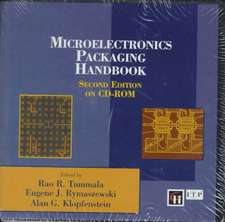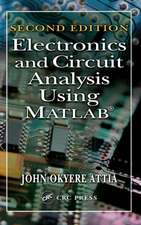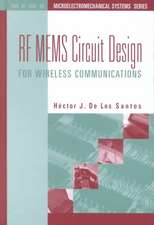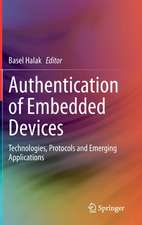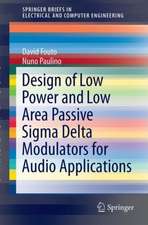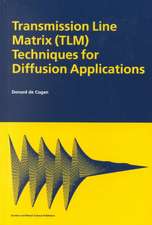Physically Unclonable Functions: From Basic Design Principles to Advanced Hardware Security Applications
Autor Basel Halaken Limba Engleză Paperback – 8 feb 2019
This book has many features that make it a unique source for students, engineers and educators, including more than 80 problems and worked exercises, in addition to, approximately 200 references, which give extensive direction for further reading.
| Toate formatele și edițiile | Preț | Express |
|---|---|---|
| Paperback (1) | 453.21 lei 6-8 săpt. | |
| Springer International Publishing – 8 feb 2019 | 453.21 lei 6-8 săpt. | |
| Hardback (1) | 589.02 lei 6-8 săpt. | |
| Springer International Publishing – 27 apr 2018 | 589.02 lei 6-8 săpt. |
Preț: 453.21 lei
Nou
Puncte Express: 680
Preț estimativ în valută:
86.73€ • 89.60$ • 72.18£
86.73€ • 89.60$ • 72.18£
Carte tipărită la comandă
Livrare economică 26 martie-09 aprilie
Preluare comenzi: 021 569.72.76
Specificații
ISBN-13: 9783030082932
ISBN-10: 3030082938
Pagini: 250
Ilustrații: XIX, 250 p. 92 illus., 62 illus. in color.
Dimensiuni: 155 x 235 mm
Greutate: 0.39 kg
Ediția:Softcover reprint of the original 1st ed. 2018
Editura: Springer International Publishing
Colecția Springer
Locul publicării:Cham, Switzerland
ISBN-10: 3030082938
Pagini: 250
Ilustrații: XIX, 250 p. 92 illus., 62 illus. in color.
Dimensiuni: 155 x 235 mm
Greutate: 0.39 kg
Ediția:Softcover reprint of the original 1st ed. 2018
Editura: Springer International Publishing
Colecția Springer
Locul publicării:Cham, Switzerland
Cuprins
A Primer on Cryptographic Primitives and Security Attacks.- Physically Unclonable Functions: Design Principles and Evaluation Metrics.- Reliability Challenges of Silicon-Based Physically Unclonable Functions.- Reliability Enhancement Techniques for Physically Unclonable Functions.- Security Attacks on Physically Unclonable Functions and Possible Countermeasures.- Hardware-based Security Applications of Physically Unclonable Functions.- Appendix 1.- Appendix 2.- Appendix 3.
Notă biografică
Dr. Basel Halak is the director of the Embedded Systems Master program at Southampton University. He is a member of the Sustainable Electronics Research group, as well as, Cyber Security group at Electronics and Computer Science School (ECS). He has written over 60 conference and journal papers, and authored two books. He has received his PhD degree in Microelectronics System Design from Newcastle University. He was then awarded a knowledge transfer fellowship to develop secure and energy efficient design for portable health care monitoring systems. His background is on the design and implementation of microelectronics systems, with special focus on developing secure hardware implementation for cryptographic primitives such as physically unclonable functions. Dr Halak lectures on digital design, Secure Hardware and Cryptography, supervises a number of MSc and PhD students, and is also leading the European Masters in Embedded Computing Systems (EMECS). He is the recipient of the Vice Chancellor Teaching Award in 2016, and the bronze leaf award in IEEE PRIME conference for his paper on current-based physically unclonable functions. He is a senior fellow of the Higher Education Academy (HEA), a guest editor of the IET CDT, and serves on several technical program committees such as IEEE ICCCA, ICCCS, MTV, IVSW, MicDAT and EWME. He is also member of hardware security working group of the World Wide Web Consortium (W3C).
Textul de pe ultima copertă
This book discusses the design principles of physically unclonable functions (PUFs) and how these can be employed in hardware-based security applications, in particular, the book:
- Provides readers with a comprehensive overview of security threats on embedded systems and existing countermeasures;
- Includes an intensive tutorial on how to design and evaluate physically unclonable functions, supported by circuit diagrams and exemplar hardware implementations;
- Discusses the reliability challenges facing PUF technology and explains in details the state of the art mitigation approaches adopted, including those based on error correction codes and/or pre-processing techniques;
- Gives a comprehensive tutorial on the security threats facing PUF technology, including modelling attacks using machine learning algorithms, side channel analysis, and physical attacks. It also outlines possible countermeasures and defence mechanisms;
- Explains in detailed the practical applications of PUF technology, these include secure cryptographic key generation and storage, hardware-assisted security protocols, low cost secure sensors, anti-counterfeit integrated circuits and anti-tamper hardware.
Caracteristici
Provides readers with a comprehensive overview of security threats on embedded systems and existing countermeasures Includes an intensive tutorial on how to design and evaluate physically unclonable functions, supported by circuit diagrams and exemplar hardware implementations Discusses the reliability challenges facing PUF technology and explains in details the state of the art mitigation approaches adopted, including those based on error correction codes and/or pre-processing techniques Gives a comprehensive tutorial on the security threats facing PUF technology, including modelling attacks using machine learning algorithms, side channel analysis, and physical attacks. It also outlines possible countermeasures and defence mechanisms Explains in detailed the practical applications of PUF technology, these include secure cryptographic key generation and storage, hardware-assisted security protocols, low cost secure sensors, anti-counterfeit integrated circuits and anti-tamper hardware


